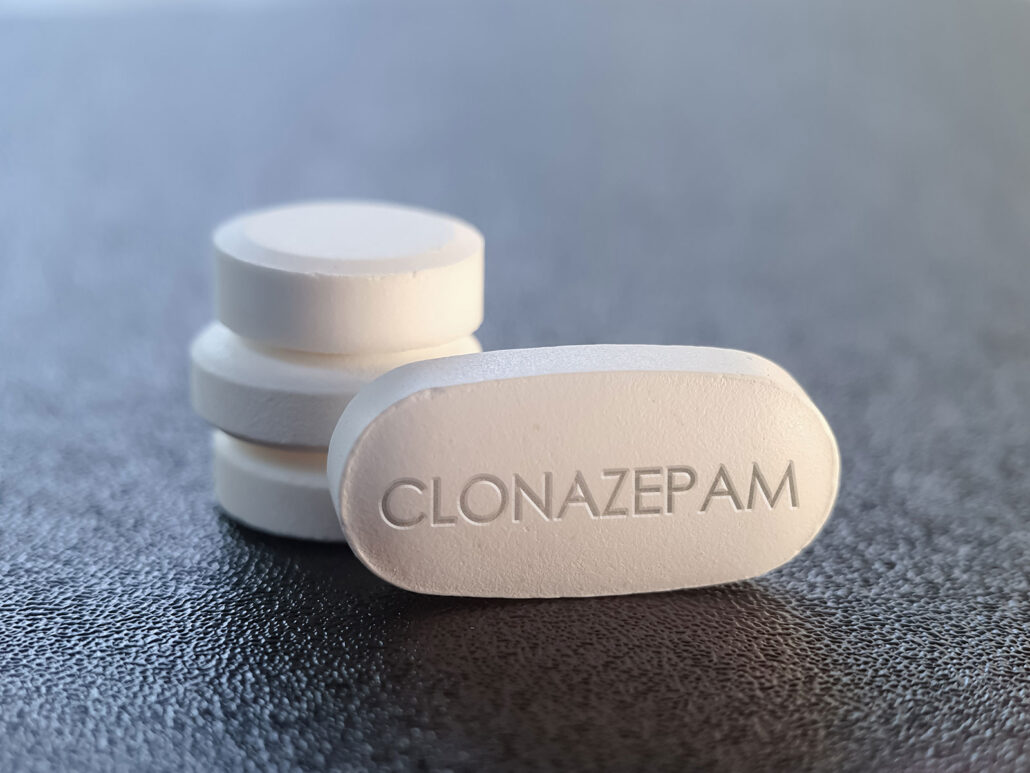Klonopin is one of the most popular brand names for clonazepam, which is a medication used primarily as an anticonvulsant to manage seizures in addition to treating panic attack disorders.
The drug was patented in 1964 and was marketed as an anti-seizure medication during the mid-1970s, achieving great success.
Despite the drug’s effectiveness, it’s also associated with a high risk of dependence and addiction when misused against prescription orders.

That being said, Klonopin addiction treatment is still possible, and in this guide, you’ll find a brief overview of the various approaches individuals can take to get their lives back on track.
Table of Contents
- 1 Understanding Klonopin (Clonazepam)
- 2 How Klonopin Addiction Develops
- 3 Signs and Symptoms of Klonopin Addiction
- 4 Dangers of Prolonged Klonopin Misuse
- 5 Navigating Klonopin Withdrawal and Detoxification
- 6 Comprehensive Treatment Options for Klonopin Addiction
- 7 Challenges and Considerations in Klonopin Addiction Treatment
- 8 Stories of Hope and Recovery
- 9 Conclusion
- 10 References
Understanding Klonopin (Clonazepam)
Clonazepam is one of the most unique tranquilizing drugs of the benzodiazepine class. This is mainly because it has a relatively longer duration of action along with high potency.
Besides the standard anxiolytic activity of the class, clonazepam also processes anticonvulsant and skeletal muscle relaxant properties.
These unique characteristics make it one of the most popular drugs to treat various mental health problems, especially seizures and panic disorders. It’s also used to treat bipolar mania and psychosis-related agitation.
The drug’s mechanism of action involves enhancing the effects of Gamma-aminobutyric acid (GABA), which is a natural brain inhibitory neurotransmitter responsible for reducing the neuronal excitability of the central nervous system.
By increasing GABA’s activity, Klonopin helps induce a sense of relaxation and calmness that lasts for several hours.
How Klonopin Addiction Develops
To better understand the development of Klonopin addiction, we should first distinguish between therapeutic use, dependency, and addiction:
Klonopin addiction usually starts with a perfectly legitimate prescription for any of the drug’s indications.
However, the prolonged use of Klonopin can lead to drug tolerance, which develops as the body adapts to Klonopin, requiring higher doses to achieve the same effect.

Consequently, this leads to physical dependence where the body adapts to the drug’s presence and experiences discomfort when you stop taking the drugs.
If physical dependence isn’t addressed, it turns into an addiction, which displays various mental and behavioral signs, but more about that in the following section.
Some biological factors like genetic predisposition and altered brain chemistry can speed up the rate of addiction or increase its susceptibility.
Additionally, psychological factors like stress and trauma can also contribute to misusing or abusing the drug.
Other factors that can also elevate the risk of Klonopin addiction are:
- Long-term use
- Concurrent substance abuse
- Suffering from underlying mental health conditions
Signs and Symptoms of Klonopin Addiction
Klonopin addiction manifests through a combination of symptoms and signs that can take many forms. These include:
- Physical Symptoms: Dizziness, impaired coordination, slurred speech, blurred vision, tremors, muscle weakness, and slow reflexes
- Psychological Symptoms: Confusion, mood swings, irritability, memory problems, depression, and increased anxiety.
- Behavioral Red Flags: Seeking multiple prescriptions, preoccupation with obtaining and using the drug, and withdrawal from daily activities.
Dangers of Prolonged Klonopin Misuse
Prolonged misuse of Klonopin can have severe and far-reaching consequences, impacting both physical and mental health.
One of the most significant risks associated with prolonged use of Klonopin is the elevated risk of life-threatening overdoses due to tolerance buildup. In severe cases, an overdose can cause respiratory depression and progress to coma and even death.

Chronic misuse of Klonopin can have detrimental effects on long-term cognitive function as well as significant memory impairment.
Another problem with prolonged use of Klonopin is that it can also trigger some rebound symptoms upon withdrawal. These include exacerbated anxiety or seizures due to the body’s adaptation to the drug dose.
Lastly, combining the drug with other depressants, especially alcohol can significantly intensify its depressant effects, which can easily reach life-threatening levels.
One of the most challenging aspects of treating Klonopin addiction is its severe withdrawal symptoms, which include insomnia, irritability, heightened anxiety, physical discomfort, and much more.
To safely navigate through these severe side effects, medical supervision is crucial during the Klonopin detox phase.
For instance, quitting Klonopin cold turkey is never recommended, especially for intense addictions because the withdrawal symptoms can reach a life-threatening level.
For that reason, professional guidance ensures a safe and gradual tapering process, minimizing discomfort and reducing the risk of complications.
Comprehensive Treatment Options for Klonopin Addiction
Treating Klonopin addiction can take a variety of forms, and each one has its own advantages. So a carefully planned combination of the different techniques is usually the best way to go.
Here’s a quick look at the different treatment options medical professionals typically recommend for Klonopin addiction.
Inpatient vs. Outpatient Rehab
The first step medical professionals will take to address addiction is establishing a rehabilitation program for the treatment process. These programs can take two forms, which are inpatient and outpatient treatment.

Inpatient rehab offers intensive 24/7 care in a structured and supportive environment. This approach is particularly beneficial for individuals with severe addictions, and complex withdrawal symptoms. It’s also recommended for patients with a history of previous relapses.
On the other hand, outpatient rehab provides a more flexible treatment approach, allowing individuals to maintain their daily/professional life schedule while attending regular therapy sessions.
This approach is often suitable for those with less severe addictions, and therefore, have a lower risk of severe withdrawal symptoms.
Evaluating the most suitable option between the two is based on these factors in addition to personal needs and the strength of the patient’s support network.
Behavioral and Psychological Therapies
Behavioral and psychological therapies also have a significant impact on the success of Klonopin addiction treatment. These can take a variety of forms, and the most well-established ones include:
- Cognitive-Behavioral Therapy (CBT): Helps patients identify and change maladaptive thinking patterns and triggers that drove them to addiction, and replace them with coping strategies.
- Dialectical Behavior Therapy (DBT): Helps individuals manage their emotions and stress to reduce impulsive behaviors and avoid succumbing to triggers.
- Motivational Interviewing: A counseling approach that aims at helping individuals strengthen their commitment to change and maintain a long-lasting recovery.
Group Sessions and Peer Support
Group therapy and peer support are essential elements of Klonopin addiction treatment, providing a supportive network where individuals can connect with others who understand their struggles.
In group therapy, participants are able to harness the therapeutic power of shared experiences. This helps them reduce their feeling of isolation and learn from each other the most effective coping strategies for a longer-lasting recovery.
Holistic and Adjunct Therapies
Holistic and adjunct therapies can also complement traditional treatment methods for Klonopin addiction.
These methods work by promoting overall well-being and addressing underlying issues that contribute to substance misuse, such as meditation, yoga, and art therapy.
Aftercare and Relapse Prevention
Overcoming Klonopin addiction requires a serious commitment to long-term recovery beyond initial treatment.
The plans are designed to identify potential triggers and develop strategies for managing cravings and high-risk situations by surrounding yourself with supportive people and building a healthy lifestyle that promotes overall well-being and self-care.

Challenges and Considerations in Klonopin Addiction Treatment
The path towards full recovery from Klonopin addiction is surrounded by several challenges that also need working out.
For example, Klonopin addiction often tags along with other mental health struggles. To truly overcome addiction, you need to address these issues as well.
Denial and fear of withdrawal are among the major barriers that prevent individuals from seeking help, especially with the stigma surrounding addiction.
Having a supportive environment is a game-changer in recovery. Besides support groups, family, friends, and healthcare professionals must also provide encouragement, understanding, and practical help throughout the treatment process to help patients commit to their results.
Stories of Hope and Recovery
Although Klonopin addiction poses a formidable challenge, it’s not an impossible hurdle to overcome.
In fact, the inspiring journeys of those who have successfully navigated their path to recovery serve as beacons of hope for all those who are still battling addiction and struggling through withdrawal.
Real-life stories, like those shared on Benzo.org, provide tangible evidence that overcoming Klonopin addiction is not only possible but can lead to a life of renewed purpose and fulfillment, such as the stories of Betsy, Carol, Bee, and Deb.
While many of these stories are shared anonymously, they offer plenty of insightful details and relatable experiences about dealing with a lack of support and the transformative power of recovery.

Conclusion
This marks the end of today’s comprehensive guide with everything you need to know about Klonopin addiction treatment.
In the end, it’s crucial to remember the gravity of addiction and the importance of seeking help as soon as possible, whether it’s for you or your loved ones.
By combining proper medical supervision with the right support and resources, individuals can embark on a journey towards holistic and lasting recovery to break free from addiction’s hold and reclaim a life of health, purpose, and fulfillment.
References
- https://www.ncbi.nlm.nih.gov/pmc/articles/PMC3684331/
- https://drugabuse.com/benzodiazepines/klonopin/history-statistics/
- https://www.ncbi.nlm.nih.gov/books/NBK513311/
- https://www.ncbi.nlm.nih.gov/pmc/articles/PMC3684331/
- https://pubmed.ncbi.nlm.nih.gov/12725868/
- https://www.apa.org/ptsd-guideline/patients-and-families/cognitive-behavioral
- https://americanaddictioncenters.org/therapy-treatment/dialectical-behavioral-therapy
- https://www.ncbi.nlm.nih.gov/pmc/articles/PMC8939890/

